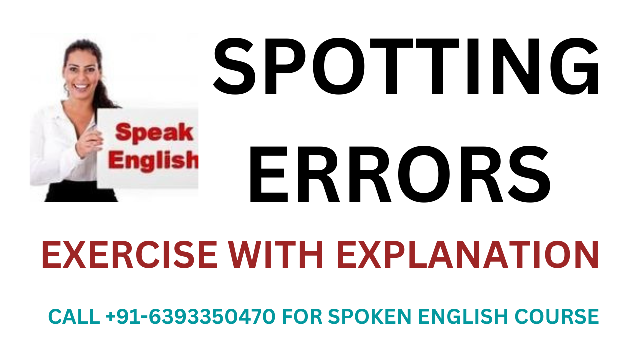Spotting Errors Exercise with Correct Answers and Explanation
..

Spotting Errors Exercise
-
As soon as you will find it there, (a)/ please intimate it (b)/ to your colleagues. (c)/ No Error (d)
Correct Answer: a)
Explanation: conditional clause (if, when, as soon as, as long as, until, unless) remains in present whereas its result is in future.
If it rains, I shall stay at home.
Until you revise the written words yourself, you won’t get enthusiasm to learn new words.
2. If you had announced this scheme in the weekend, (a)/ all the employees would take (b)/ interest in its execution. (c)/ No Error (d)
Correct Answer: b)
Explanation:
Had + would have
-
If you had studied grammar well in your school days, you would have understood these concepts easily.
Had you studied grammar well in your schooling days, you have understood these concepts easily.
-
If I had not smiled during the class, I would not have been asked to give a sentence.
Had I not smiled during the class, I would not have been asked to give a sentence.
-
If I had taken maths in my schooling days, I would have topped the exam.
Had I taken Maths in my schooling days, I would have topped the exam.
-
If I had attended the classes seriously, I would have made the sentences comfortably.
Had I attended the classes seriously, I would have made the sentences comfortably.
3. The imported articles which you sell (a)/ are enough costly to allow (b)/ the pocket of a mundane person to buy. (c)/ No Error (d)
Correct Answer: b)
Enough is both an adjective as well as an adverb.
My father has given me enough money. (ADJ)
You are intelligent enough to convince a person. (ADV)
You have enough intelligence to convince a person.
He has enough kindness.
He is kind enough.
Mundane means ordinary.
4. The students requested their principal to be (a)/ enough kind to grant them five thousand rupees (b)/ for the construction of tennis court. (c)/ No Error (d)
Correct Answer: b)
Kind enough. [ADV]
Enough kindness [ADJ]
5. I met Karishma about two years ago (a)/ and have remembered (b)/ her ever for. (c)/ No Error (d)
Correct Answer: c)
Explanation: ‘ever since’ means TAB SE
6. His essay was unmatched, (a)/ so he was awarded the best prize (b)/ in the form of a shield made of silver. (c)/ No Error (d)
Correct Answer: d)
Unmatched- amazing, stupendous
7. India played very careful (a)/ right from the beginning (b)/ of the match. (c)/ No Error (d)
Correct Answer: a)
8. All of them will execute the plan (a)/ so skillfully that their officer (b)/ will feel surprised. (c)/ No Error (d)
Correct Answer: d)
9. “Nobody should try to disturb me without any urgency.” The doctor said to his assistants.
Correct Answer: d)
Difference between very and much
-
Both are adverbs.
-
Very is used in positive degree whereas much is used in comparative degree.
He is good at English.
|
His brother is better than him.
|
He is very good.
|
His brother is much better than him.
|
I was much surprised.
I am very surprised.
10. Ankit requested his mother (a)/ to be enough kind (b)/ to allow him for this competition.(c)/ No Error (d)
Correct Answer: b)
Enough – ADJ
|
Enough-ADV
|
Enough money
|
Kind enough
|
Enough strength
|
Polite enough
|
Some- ADJ | somewhat- ADV
I have some questions.
He has some anger.
He is somewhat angry.
He has some sincerity.
He is somewhat sincere.
She has some confidence for it.
She is somewhat confident.
11. I met that leader two years ago (a)/ and have remembered (b)/ him ever for. (c)/ No Error (d)
‘ever since’ means TAB SE
Since- point of time
For- period of time
12. His performance was stupendous (a)/ so he was awarded (b)/ with the best prize. (c)/ No Error (d)
Correct Answer: d)
Stupendous- amazing
13. The leaders of the striking teachers (a)/ called on the chief minister (b)/ for negotiation and returned happily. (c)/ No Error (d)
Correct Answer: d)
Negotiate (V)- to convince SAMJHANA
14. I hardly ever see him (a)/ because in my opinion he is generally busy (b)/ with his assignments. (c)/ No Error (d)
Correct Answer: d)
Hardly ever is a correct expression which means MUSHKIL SE HI KABHI
If a sentence begins with negative adverbs like No sooner, hardly, scarcely, seldom, barely, rarely, not only but also, never, under no circumstance, the rule of inversion is followed. It means the helping verb comes before the subject.
Difference between some and somewhat
Some is an adjective and somewhat is an adverb.
We hope that you must have found this exercise quite useful. If you wish to join online courses on Networking Concepts, Machine Learning, Angular JS, Node JS, Flutter, Cyber Security, Core Java and Advance Java, Power BI, Tableau, AI, IOT, Android, Core PHP, Laravel Framework, Core Java, Advance Java, Spring Boot Framework, Struts Framework training, feel free to contact us at +91-9936804420 or email us at aditya.inspiron@gmail.com.
Happy Learning
Team Inspiron Technologies



Leave a comment